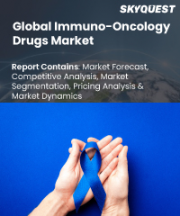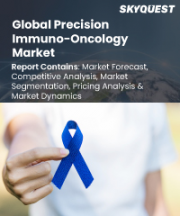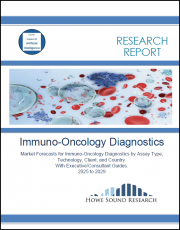
|
시장보고서
상품코드
1831659
면역종양학 시장, 규모, 점유율, 동향, 산업 분석 보고서 : 치료 접근법별, 신규 표적 유형별, 종양 또는 암 유형별, 지역별, 예측(2025-2034년)Immuno-Oncology Market Size, Share, Trends, Industry Analysis Report By Treatment Approaches (Monoclonal Antibodies, Therapeutic Vaccines), By Novel Target Type, By Tumor or Cancer Type, By Region - Market Forecast, 2025-2034 |
||||||
Polaris Market Research의 최근 조사에 따르면, 면역종양학 시장 규모는 2034년까지 2,163억 4,000만 달러에 이를 것으로 예측됩니다. 이 보고서는 현재 시장 역학을 상세하게 통찰하고 미래 시장 성장에 대한 분석을 제공합니다.
면역종양학은 체내 면역계에 암세포를 인식하고 정확하게 싸우는 힘을 주는 선진적인 치료 접근법으로 정의할 수 있습니다. 이 시장을 견인하는 것은 여러 치료법을 통합하여 효능을 높이고, 내성 기전을 극복하고, 보다 지속적인 임상 반응을 일으키는 면역요법 병용요법의 급속한 보급입니다. 이러한 접근법은 분자 생물학과 면역 프로파일 링의 진보에 힘입어 단독 요법과 비교하여 환자의 예후를 개선함으로써 인기를 얻고 있습니다. 이러한 병용 요법이 성공을 거두면서 연구 투자가 촉진되고 다양한 암종에 대한 적용 범위가 확대되어 시장 발전의 요점으로서의 역할이 강화되고 있습니다.
면역종양학 시장은 바이오마커 주도의 치료 전략에 대한 주목 증가에 의해 더욱 영향을 받고 있으며, 고도로 표적화된 맞춤형 치료 시장 개척을 가능하게 하고 있습니다. 임상의는 유전자 돌연변이, 면역 서명, 종양 미세환경 특성 등의 바이오마커를 활용하여 환자의 반응을 보다 정확하게 예측하고 그에 따라 치료를 조정할 수 있습니다. 이 정확성에 초점을 맞춘 접근법은 치료 효과를 최적화하고 부작용을 최소화하며 전반적인 치료 내약성을 향상시킵니다. 게다가 바이오마커 연구가 의약품 개발 파이프라인에 통합됨으로써 기술 혁신이 가속화되고 면역종양학에서 보다 개별화된 암 치료 솔루션으로의 전환이 가능해지고 있습니다.
면역종양학 시장 보고서 하이라이트
치료 접근법별로는 PD-1/PD-L1 및 CTLA-4를 표적으로 하는 체크포인트 억제제가 2024년의 매출 점유율 57.42%로 선두를 달렸습니다.
새로운 표적 유형별로, A2AR 길항제/CD73i 치료제 부문은 종양에서 아데노신을 통한 면역억제를 억제함으로써 예측 기간 동안 16.1%의 연평균 복합 성장률(CAGR)로 성장할 것으로 예측됩니다.
2024년에는 북미가 31.27%의 세계 점유율을 차지하며, 선진 헬스케어 시스템과 바이오파마의 혁신 거점에 지지를 받고 있습니다.
아시아태평양의 면역종양학 시장은 2034년까지 16.3%의 연평균 복합 성장률(CAGR)로 성장할 것으로 예측되며, 치료에 대한 액세스와 헬스케어 투자 증가가 그 요인이 되고 있습니다.
세계 주요 면역종양학 시장 진출 기업으로는 Amgen, Inc.; AstraZeneca; Bristol Myers Squibb; Eli Lilly and Company; GlaxoSmithKline Plc; Incyte Corporation; Janssen Biotech, Inc; Merck& Co.; Novartis AG; Pfizer Inc.; Roche Holding AG; Sanofi; and Takeda Pharmaceuticals등이 있습니다.
목차
제1장 서론
제2장 조사 방법의 개요
- 조사 과정
- 정보 조달
- 구입한 데이터베이스:
- Polaris market research의 내부 데이터베이스
- 조사 방법
- 조사 범위와 전제
- 데이터 소스 목록
제3장 주요 요약
제4장 면역종양학(IO) 시장 인사이트
- 면역종양학(IO) - 시장 세분화 및 범위
- 시장의 정의
- 면역종양학(IO) - 시장 규모와 성장 전망
- 면역종양학(IO) - 값 체인 분석
- 시장 역학
- 성장 촉진요인
- 종래와는 다른 고도의 치료 기술의 도입 증가
- 급속히 증가하는 다양한 암 감염 환자 수
- 억제요인
- 면역요법에의 접근과 인지도의 낮음
- 기회 분석 : 면역종양학 시장
- 환자에 의한 암 치료 개선에 대한 수요 증가
- 성장 촉진요인
- Porter's Five Forces 분석
- 면역종양학(IO) - 기업의 시장 점유율 분석, 2024년
- PEST 분석 : 면역종양학 시장
- 면역종양학 시장을 형성하는 5가지 힘
- COVID-19의 영향 분석
제5장 면역종양학 시장 : 치료 접근법별 추정 및 예측
- 치료 유형별 시장 규모
- 단일클론항체
- 치료 백신
- 체크포인트 억제제
- 사이토카인
제6장 면역종양학 시장 : 신규 표적 유형별 추정 및 예측
- 신규 표적 유형별 시장 규모
- IDO1i
- LAG-3 CPI
- 종양 용해성 바이러스
- STING agonist
- TLR agonist
- HDACi
- TIL
- VEGFi
- MEKi
- TIGIT
- CPI
- GITR agonist
- TGF-b 트랩
- A2AR 길항제/CD73i
제7장 면역종양학 시장 : 종양 또는 암 유형별 추정 및 예측
- 종양 또는 암 유형별 시장 규모
- 흑색종
- 비소세포 폐암
- 신세포암
- 두경부암
- 방광암
- 기존 호지킨 림프종
- 메르켈 세포암
- 기타 암 유형
제8장 면역종양학 시장 : 지역별 추정 및 예측
- 지역별 시장 규모
- 북미
- 미국
- 캐나다
- 유럽
- 프랑스
- 독일
- 이탈리아
- 스페인
- 영국
- 오스트리아
- 네덜란드
- EU 기타 지역
- 아시아태평양
- 중국
- 인도
- 일본
- 인도네시아
- 한국
- 말레이시아
- 아시아태평양
- 라틴아메리카
- 브라질
- 멕시코
- 아르헨티나
- 기타 라틴아메리카 국가
- 중동 및 아프리카
- 이스라엘
- 사우디아라비아
- 남아프리카
- 아랍에미리트(UAE)
- 기타 중동 및 아프리카
제9장 경쟁 구도
- 전략적 틀
- COVID-19 팬데믹 중에 주요 기업이 채택한 전략
- 경쟁 환경
- 합병 및 인수 분석
제10장 기업 프로파일
- Bristol Myers Squibb
- Merck & Co.
- AstraZeneca
- Roche Holding AG
- Pfizer Inc.
- Incyte Corporation
- Amgen, Inc.
- Eli Lilly and Company
- GlaxoSmithKline Plc
- Janssen Biotech, Inc
- Novartis AG
- Sanofi
- Takeda Pharmaceuticals
The Immuno-oncology market size is expected to reach USD 216.34 billion by 2034, according to a new study by Polaris Market Research. The report "Immuno-Oncology Market Share, Size, Trends, Industry Analysis Report By Treatment Approaches (Monoclonal Antibodies, Therapeutic Vaccines), By Novel Target Type, By Tumor or Cancer Type, By Region; Market Forecast, 2025-2034" gives a detailed insight into current market dynamics and provides analysis on future market growth.
Immuno-oncology can be defined as an advanced therapeutic approach that empowers the body's immune system to recognize and combat cancer cells with precision. This market is driven by the rapid adoption of combination immunotherapies, which integrate multiple treatment modalities to enhance efficacy, overcome resistance mechanisms, and provide more durable clinical responses. These approaches are gaining traction as they deliver improved patient outcomes compared to monotherapies, supported by ongoing advancements in molecular biology and immune profiling. The increasing success of such combinations is driving research investment and expanding the scope of application across various cancer types, reinforcing their role as a cornerstone of the market's evolution.
The immuno-oncology market is further influenced by the growing focus on biomarker-driven treatment strategies, enabling the development of highly targeted and personalized therapies. Clinicians can better predict patient response and tailor treatments accordingly by leveraging biomarkers such as genetic mutations, immune signatures, and tumor microenvironment characteristics. This precision-focused approach optimizes therapeutic effectiveness and also minimizes adverse effects, improving overall treatment tolerability. Additionally, the integration of biomarker research into drug development pipelines is accelerating innovation and enabling a shift toward more individualized cancer care solutions within the immuno-oncology landscape.
Immuno-Oncology Market Report Highlights
In terms of treatment approaches, the checkpoint inhibitors led with 57.42% revenue share in 2024, driven by their durable clinical responses across cancers through PD-1/PD-L1 and CTLA-4 targeting.
Based on novel target type, the A2AR antagonist/CD73i therapies segment is expected to register the highest CAGR of 16.1% during the forecast period by disrupting adenosine-mediated immunosuppression in tumors.
In 2024, North America dominated with 31.27% global share, supported by advanced healthcare systems and biopharma innovation hubs.
The Asia Pacific Immuno-Oncology Market would report a CAGR of 16.3% by 2034, fueled by rising treatment access and healthcare investments.
A few global key Immuno-Oncology Market players include Amgen, Inc.; AstraZeneca; Bristol Myers Squibb; Eli Lilly and Company; GlaxoSmithKline Plc; Incyte Corporation; Janssen Biotech, Inc; Merck & Co.; Novartis AG; Pfizer Inc.; Roche Holding AG; Sanofi; and Takeda Pharmaceuticals.
Polaris Market Research has segmented the Immuno-Oncology Market report on the basis of treatment approaches, novel target type, tumor or cancer type, and region:
By Treatment Approaches Outlook (Revenue, USD Billion, 2020-2034)
Monoclonal Antibodies
Therapeutic Vaccines
Checkpoint Inhibitors
Cytokines
By Novel Target Type Outlook (Revenue, USD Billion, 2020-2034)
IDO1i
LAG-3 CPI
Oncolytic Virus
STING Agonist
TLR Agonist
HDACi
TIL
VEGFi
MEKi
TIGIT
CPI
GITR Agonist
TGF-b trap
A2AR Antagonist/CD73i
By Tumor or Cancer Type Outlook (Revenue, USD Billion, 2020-2034)
Melanoma
Non-Small Cell Lung Cancer
Renal Cell Carcinoma
Head, Face & Neck Cancer
Bladder Cancer
Classical Hodgkin's Lymphoma
Merkel Cell Carcinoma
Other Cancer Types
By Regional Outlook (Revenue, USD Billion, 2020-2034)
North America
U.S.
Canada
Europe
Germany
UK
France
Italy
Spain
Russia
Netherlands
Rest of Europe
Asia Pacific
China
India
Japan
South Korea
Indonesia
Malaysia
Vietnam
Australia
Rest of Asia Pacific
Latin America
Argentina
Brazil
Mexico
Rest of Latin America
Middle East & Africa
UAE
Saudi Arabia
Israel
South Africa
Rest of Middle East & Africa
Table of Contents
Chapter 1. Introduction
- 1.1 Report Description
Chapter 2. Research Methodology Overview
- 2.1 Research Process
- 2.1.1 Information procurement
- 2.1.2 Purchased database:
- 2.1.3 Polaris Market Research's internal database
- 2.2 Research Methodology
- 2.3 Research Scope & Assumptions
- 2.4 List of Data Sources
Chapter 3. Executive Summary
- 3.1 Market Snapshot - Key Takeaways
- 3.2 Immuno-Oncology (IO) regional market place: Key takeaways
Chapter 4. Immuno-Oncology (IO) Market Insights
- 4.1 Immuno-Oncology (IO) - Market segmentation & scope
- 4.1.1 Market definitions
- 4.2 Immuno-Oncology (IO) - Market size and growth prospects
- 4.3 Immuno-Oncology (IO) - Value chain analysis
- 4.4 Market Dynamics
- 4.4.1 Drivers
- 4.4.1.1 Increasing introduction of unconventional and advanced treatment techniques
- 4.4.1.2 Rapidly growing population of various cancer infected patients
- 4.4.2 Restraints
- 4.4.2.1 Limited access and awareness about immunotherapy
- 4.4.3 Opportunity analysis: Immunology-oncology market
- 4.4.3.1 Increasing demand for improved cancer care by patients
- 4.4.1 Drivers
- 4.5 Porter's Five Forces Analysis
- 4.6 Immuno-Oncology (IO) - Company Market Share Analysis, 2024
- 4.7 PEST Analysis: Immuno-Oncology Market
- 4.8 Five forces shaping the immuno-oncology market
- 4.9 COVID-19 Impact Analysis
Chapter 5. Immuno-Oncology Market Estimates and Forecast, by Treatment Approaches
- 5.1 Market size by treatment type
- 5.2 Monoclonal Antibodies
- 5.2.1 Global Immuno-Oncology monoclonal antibodies treatment market estimates & forecasts by region, 2021-2034
- 5.3 Therapeutic Vaccines
- 5.3.1 Global Immuno-Oncology therapeutic vaccines treatment market estimates & forecasts by region, 2021-2034
- 5.4 Checkpoint Inhibitors
- 5.4.1 Global Immuno-Oncology checkpoint inhibitors treatment market estimates & forecasts by region, 2021-2034
- 5.5 Cytokines
- 5.5.1 Global Immuno-Oncology cytokines treatment market estimates & forecasts by region, 2021-2034
Chapter 6. Immuno-Oncology Market Estimates and Forecast, by Novel Target Type
- 6.1 Market size by novel target type
- 6.2 IDO1i
- 6.2.1 Global Immuno-Oncology market estimates & forecasts for IDO1i target by region, 2021-2034
- 6.3 LAG-3 CPI
- 6.3.1 Global Immuno-Oncology market estimates & forecasts for LAG-3 CPI target by region, 2021-2034
- 6.4 Oncolytic virus
- 6.4.1 Global Immuno-Oncology market estimates & forecasts for Oncolytic virus target by region, 2021-2034
- 6.5 STING agonist
- 6.5.1 Global Immuno-Oncology market estimates & forecasts for STING agonist target by region, 2021-2034
- 6.6 TLR agonist
- 6.6.1 Global Immuno-Oncology market estimates & forecasts for TLR agonist target by region, 2021-2034
- 6.7 HDACi
- 6.7.1 Global Immuno-Oncology market estimates & forecasts for HDACi target by region, 2021-2034
- 6.8 TIL
- 6.8.1 Global Immuno-Oncology market estimates & forecasts for TIL target by region, 2021-2034
- 6.9 VEGFi
- 6.9.1 Global Immuno-Oncology market estimates & forecasts for VEGFi target by region, 2021-2034
- 6.10 MEKi
- 6.10.1 Global Immuno-Oncology market estimates & forecasts for MEKi target by region, 2021-2034
- 6.11 TIGIT
- 6.11.1 Global Immuno-Oncology market estimates & forecasts for TIGIT target by region, 2021-2034
- 6.12 CPI
- 6.12.1 Global Immuno-Oncology market estimates & forecasts for CPI target by region, 2021-2034
- 6.13 GITR agonist
- 6.13.1 Global Immuno-Oncology market estimates & forecasts for GITR agonist target by region, 2021-2034
- 6.14 TGF-b trap
- 6.14.1 Global Immuno-Oncology market estimates & forecasts for TGF-b trap target by region, 2021-2034
- 6.15 A2AR antagonist/CD73i
- 6.15.1 Global Immuno-Oncology market estimates & forecasts for A2AR antagonist/CD73i target by region, 2021-2034
Chapter 7. Immuno-Oncology Market Estimates and Forecast, by Tumor or Cancer Type
- 7.1 Market size by tumor or cancer type
- 7.2 Melanoma
- 7.2.1 Global Immuno-Oncology market estimates & forecasts for melanoma cancer by region, 2021-2034
- 7.3 Non-small cell lung cancer
- 7.3.1 Global Immuno-Oncology market estimates & forecasts for non-small cell lung cancer by region, 2021-2034
- 7.4 Renal cell carcinoma
- 7.4.1 Global Immuno-Oncology market estimates & forecasts for renal cell carcinoma cancer by region, 2021-2034
- 7.5 Head, face & neck cancer
- 7.5.1 Global Immuno-Oncology market estimates & forecasts for head, face & neck cancer by region, 2021-2034
- 7.6 Bladder cancer
- 7.6.1 Global Immuno-Oncology market estimates & forecasts for bladder cancer by region, 2021-2034
- 7.7 Classical hodgkin's lymphoma
- 7.7.1 Global Immuno-Oncology market estimates & forecasts for classical hodgkin's lymphoma cancer by region, 2021-2034
- 7.8 Merkel cell carcinoma
- 7.8.1 Global Immuno-Oncology market estimates & forecasts for merkel cell carcinoma cancer by region, 2021-2034
- 7.9 Other cancer types
- 7.9.1 Global Immuno-Oncology market estimates & forecasts for other cancer types by region, 2021-2034
Chapter 8. Immuno-Oncology Market Estimates and Forecast, by Region
- 8.1 Market size by region
- 8.2 North America
- 8.2.1 U.S.
- 8.2.2 Canada
- 8.3 Europe
- 8.3.1 France
- 8.3.2 Germany
- 8.3.3 Italy
- 8.3.4 Spain
- 8.3.5 UK
- 8.3.6 Austria
- 8.3.7 Netherlands
- 8.3.8 Rest of EU
- 8.4 Asia Pacific
- 8.4.1 China
- 8.4.2 India
- 8.4.3 Japan
- 8.4.4 Indonesia
- 8.4.5 South Korea
- 8.4.6 Malaysia
- 8.4.7 RoAPAC
- 8.5 Latin America
- 8.5.1 Brazil
- 8.5.2 Mexico
- 8.5.3 Argentina
- 8.5.4 Rest of LATAM
- 8.6 Middle East & Africa
- 8.6.1 Israel
- 8.6.2 Saudi Arabia
- 8.6.3 South Africa
- 8.6.4 UAE
- 8.6.5 Rest of Middle East & Africa
Chapter 9. Competitive Landscape
- 9.1 Strategy framework
- 9.2 Strategies Adopted By Major Players During COVID-19 Pandemic
- 9.3 Competitive Environment
- 9.4 Merger & Acquisition Analysis
Chapter 10. Company Profiles
- 10.1 Bristol Myers Squibb
- 10.1.1 Company Overview
- 10.1.2 Financial Performance (Revenue)
- 10.1.3 Product Benchmarking
- 10.1.4 Recent Developments
- 10.2 Merck & Co.
- 10.2.1 Company Overview
- 10.2.2 Financial Performance (Revenue)
- 10.2.3 Product Benchmarking
- 10.2.4 Recent Developments
- 10.3 AstraZeneca
- 10.3.1 Company Overview
- 10.3.2 Financial Performance (Revenue)
- 10.3.3 Product Benchmarking
- 10.3.4 Recent Developments
- 10.4 Roche Holding AG
- 10.4.1 Company Overview
- 10.4.2 Financial Performance (Revenue)
- 10.4.3 Product Benchmarking
- 10.4.4 Recent Developments
- 10.5 Pfizer Inc.
- 10.5.1 Company Overview
- 10.5.2 Financial Performance (Revenue)
- 10.5.3 Product Benchmarking
- 10.5.4 Recent Developments
- 10.6 Incyte Corporation
- 10.6.1 Company Overview
- 10.6.2 Financial Performance
- 10.6.3 Product Benchmarking
- 10.6.4 Recent Developments
- 10.7 Amgen, Inc.
- 10.7.1 Company Overview
- 10.7.2 Financial Performance (Revenue)
- 10.7.3 Product Benchmarking
- 10.7.4 Recent Developments
- 10.8 Eli Lilly and Company
- 10.8.1 Company Overview
- 10.8.2 Financial Performance (Revenue)
- 10.8.3 Product Benchmarking
- 10.8.4 Recent Developments
- 10.9 GlaxoSmithKline Plc
- 10.9.1 Company Overview
- 10.9.2 Financial Performance (Revenue)
- 10.9.3 Product Benchmarking
- 10.9.4 Recent Developments
- 10.10 Janssen Biotech, Inc
- 10.10.1 Company Overview
- 10.10.2 Jonson & Johnson Financial Performance (Revenue)
- 10.10.3 Product Benchmarking
- 10.10.4 Recent Developments
- 10.11 Novartis AG
- 10.11.1 Company Overview
- 10.11.2 Financial Performance (Revenue)
- 10.11.3 Product Benchmarking
- 10.11.4 Recent Developments
- 10.12 Sanofi
- 10.12.1 Company Overview
- 10.12.2 Financial Performance (Revenue)
- 10.12.3 Product Benchmarking
- 10.12.4 Recent Developments
- 10.13 Takeda Pharmaceuticals
- 10.13.1 Company Overview
- 10.13.2 Financial Performance (Revenue)
- 10.13.3 Product Benchmarking
- 10.13.4 Recent Developments



















